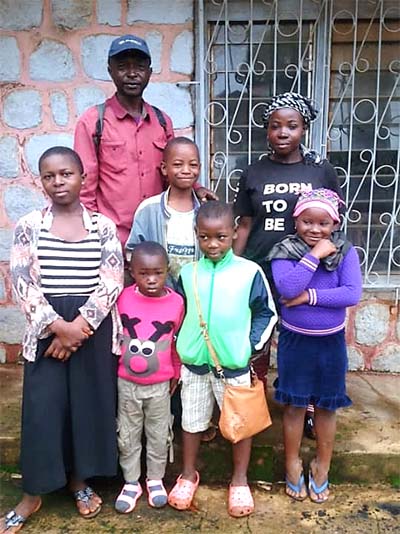
Cameroon Conflict Displaces Families
Violence in Northwest Region of Cameroon has forced already hard-pressed families to flee their homes in search of some measure of security. They take only what they can carry from their homes. They survive only to find they have limited income opportunities and struggle to pay for food and household expenses.
The CRS-led Anglophone Crisis Emergency Response, or ACER project, funded by the U.S. Agency for International Development’s Bureau for Humanitarian Assistance is helping families in the Northwest Region cover their needs during this period of insecurity and the COVID-19 pandemic.

Joseph stands with his three children, his younger sister and her two children, who came to live with Joseph after his wife died. Photo by CRS Staff.
One participant who has benefited from the project is Joseph, a 41-year-old teacher from Kumbo. Amid the sound of gunshots and reports of kidnappings, threats and killings within his own community, Joseph fled his home in September 2018 with his wife and three children to seek shelter in Douala—Cameroon’s largest city and economic center.
During the two years since, Joseph and his family have relocated four times, in the end returning to the Northwest Region and settling in the city of Akum. With his wife suffering from a heart condition, Joseph picked up odd jobs during this period of displacement but was unable to save enough money for a medical intervention that could have saved her life. She passed away during the family’s stay in Douala. Since then, Joseph’s younger sister joined him with her two children, resulting in a total of seven family members under Joseph’s care.
Despite Joseph’s efforts to support his family, his children were sometimes still going to bed hungry. Then he heard about the ACER project, implemented by CRS and its local partner, Caritas, in the Archdiocese of Bamenda. It was at this point that things began to take a positive turn.
“I heard about CRS and Caritas from my neighbor who registered last year and benefited from the e-voucher card system,” says Joseph.
“What a blessed experience,” he says. “My family can now eat three square meals a day. As a result, the children no longer sleep hungry due to lack of food to eat. We are so grateful for the project. I am now hopeful as [CRS and Caritas] have eased my burden. With the food they provided for me and my family, I am now ready to save what I get from odd job, something I had not done ever since the death of my wife.”
What Joseph and his family have experienced is currently being lived by many families who are displaced in what is known as the Anglophone region of Cameroon. In September 2017, separatists in the Anglophone territories declared the independence of a state they call Ambazonia and began fighting against Cameroon’s government. Starting as a low-scale insurgency, the conflict spread to most parts of the Anglophone regions within a year, and as a result, many families fled their homes and struggled to meet their daily needs.
In response to the two most urgent needs of the affected population in the Northwest Region, CRS and Caritas are implementing the 12-month Bureau of Humanitarian Assistance-funded ACER project. The ACER project plans to meet the immediate needs of 27,750 individuals in over 3,900 affected households by providing six rounds of monthly food assistance and a one-time disbursement of funds for household items and hygiene supplies. Project participants have cards on which they receive credit to purchase these essential items at almost 70 shops in the area. As of September 2020, the project has already distributed two rounds of food assistance and household item purchasing credit.
The onset of COVID-19 has posed new threats to the already vulnerable households in the region, due to both the health risk and the negative impact of the pandemic on the Cameroon economy. In response to COVID-19, CRS and Caritas delivered food and household item assistance while helping keep participants and staff safe from the pandemic.
“COVID-19 has been the one in command for some time now, ordering us to always be more than [6 feet] from everyone, in what is called social distancing. For the team to brave the odds, with focus, attention, and courage–reaching individuals like Joseph with assistance is amazing in serving humanity,” says Brendan Fonyuy, a staffer working in CRS’ Monitoring, Evaluation, Accountability, and Learning sector.
In addition to physical distancing, the project team is promoting proper hand-washing and mask wearing protocols among participants and shop vendors while also finding new ways to work and engage remotely with participants, vendors and other local stakeholders.
Amid these challenges, CRS continues to monitor the security and health situation while focusing on the strict adherence to the COVID-19 prevention measures and delivering lifesaving humanitarian assistance to communities in need, to families like Joseph’s.

